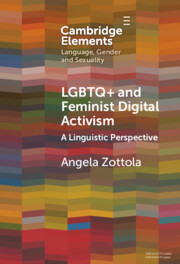Refine search
Actions for selected content:
5 results

LGBTQ+ and Feminist Digital Activism
- A Linguistic Perspective
-
- Published online:
- 08 May 2024
- Print publication:
- 06 June 2024
-
- Element
- Export citation
22 - Intercultural Teamwork via Videoconferencing Technology: A Multimodal (Inter)action Analysis
- from Part IV - Intercultural Pragmatics in Different Types of Communication
-
-
- Book:
- The Cambridge Handbook of Intercultural Pragmatics
- Published online:
- 29 September 2022
- Print publication:
- 20 October 2022, pp 552-587
-
- Chapter
- Export citation
12 - Parental Input in the Development of Children’s Multilingualism
- from Part Three - Family Language Policy
-
-
- Book:
- The Cambridge Handbook of Childhood Multilingualism
- Published online:
- 18 August 2022
- Print publication:
- 25 August 2022, pp 278-303
-
- Chapter
- Export citation
15 - A Land of Immigration and Official French–English Bilingualism
- from Part III - The Canadian Context
-
-
- Book:
- Language Politics and Policies
- Published online:
- 18 July 2019
- Print publication:
- 18 July 2019, pp 281-297
-
- Chapter
- Export citation
Part III - The Canadian Context
-
- Book:
- Language Politics and Policies
- Published online:
- 18 July 2019
- Print publication:
- 18 July 2019, pp 211-315
-
- Chapter
- Export citation
